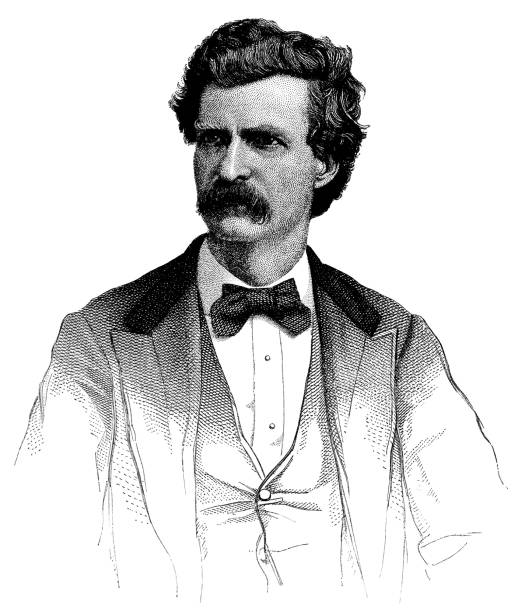Summary
Twain left school after fifth grade to become a printer’s apprentice and later worked as a typesetter, contributing humorous sketches to his brother’s newspaper. At 21, he became a Mississippi riverboat pilot, a profession that not only shaped his experiences but also gave him his pen name: “Mark Twain,” a river term meaning two fathoms deep (safe water for steamboats). This unique name would become synonymous with his literary legacy.
Rise to Fame
After a brief stint as a miner in Nevada, Twain turned to journalism and humor writing. His breakthrough came in 1865 with the short story The Celebrated Jumping Frog of Calaveras County. He went on to write travel books, such as The Innocents Abroad (1869) and Roughing It (1872), which established his reputation as a humorist and social critic.
Major Works
- The Adventures of Tom Sawyer (1876)
- Adventures of Huckleberry Finn (1884) – often called the “Great American Novel.”
- A Connecticut Yankee in King Arthur’s Court (1889)
- Life on the Mississippi (1883)
- The Prince and the Pauper (1881)
These works, which combined humor, satire, and sharp social commentary, tackled a range of themes, including race, class, and morality. Wain’s unique perspective on these issues, often presented through the lens of his characters, continues to resonate with readers today.
Later Life and Activism
Twain became a celebrated lecturer and social critic, speaking out against imperialism and colonial abuse. He served as vice President of the American Anti-Imperialist League and wrote scathing essays, such as "King Leopold’s Soliloquy” (1905), which condemned atrocities in the Congo. Despite earning a fortune, Twain faced financial ruin due to failed investments. However, he was determined to repay his debts, a feat he accomplished through extensive lecture tours worldwide, demonstrating his resilience and work ethic.
Death and Legacy
Twain died on 21 April 19100, in Redding, Connecticut—just as he predicted, coinciding with the return of Halley’s Comet, which had appeared the year he was born. William Faulkner called him “the father of American literature,” and his influence on humor, realism, and social critique remains unmatched.
Famous Mark Twain Quotes
Here are some of his most enduring lines, blending wit, wisdom, and satire:
· “The secret of getting ahead is getting started.”
· “Twenty years from now, you will be more disappointed by the things you didn’t do than by the ones you did do. So, throw off the bowlines, sail away from the safe harbor. Catch the trade winds in your sail. Explore. Dream. Discover
· The two most important days in your life are the day you are born and the day you die...
· “Keep away from people who try to belittle your ambitions. Small people always do that, but the really great make you feel that you, too, can become great.”
· “Good friends, good books, and a sleepy conscience: this is the ideal life.”
· “A banker is a fellow who lends you his umbrella when the sun is shining, but wants it back the minute it begins to rain.”
· “Don’t wait. The time will never be just right.”
· “It is wiser to find out than suppose.”
· “The two most important days in your life are the day you are born and the day you find out why.”
· “All you need in this life is ignorance and confidence, and then success is sure.”
Here’s the context behind some of Mark Twain’s most famous quotes—why he said them and what they reflect about his worldview:
. “The secret of getting ahead is getting started.”
- Context: Twafrequently discussed procrastination and the paralysis that can result from overthinking. This quote reflects his practical, action-oriented philosophy: progress begins with the first step, not endless planning.
- Lesson: Don’t wait for perfect conditions—momentum matters more than perfection.
2. “Twenty years from now, you will be more disappointed by the things you didn’t do than by the ones you did do.”
- Context: Twain was an adventurer at heart—river pilot, prospector, world traveler. His autobiographye reflects his belief in boldness and exploration, themes echoed in The Innocents Abroad and in his lecture tours.
- Lesson: Regret often comes from inaction, not failure. Take calculated risks.
3 “The two most important days in your life are the day you are born, and the day you find out why.”
- Context: Twaig struggled with questions of purpose and meaning, particularly later in life, following personal losses and financial setbacks. This quote captures his existential humor and search for significance.
- Lesson: Life isn’t just about existing—it’s about discovering purpose.
4. “Keep away from people who try to belittle your ambitions.”
- Context: Twain valued the independence of thought and despised narrow-mindedness. He critiques social conformity and mediocrity in his essays and speeches.
- Lesson: Surround yourself with people who elevate, not diminish, your aspirations.
. “Good friends, good books, and a sleepy conscience: this is the ideal life.”
- Context: Twain’s humor often masked profound truths. Here, he pokes fun at moral rigidity while celebrating simple friendship, literature, and peace of mind.
- Lesson: Happiness often lies in simplicity, not in relentless striving.
6 “All you need in this life is ignorance and confidence, and then success is sure.”
- Context: A satirical jab at unquestioning optimism and overconfidence, common traits Twain observed in business and polit cs. It’s humorous, but also a critique of superficial success, reminding you to be cautious and thoughtful in your pursuits.
- Lesson: Confidence matters—but without wisdom, it’s a gamble.
